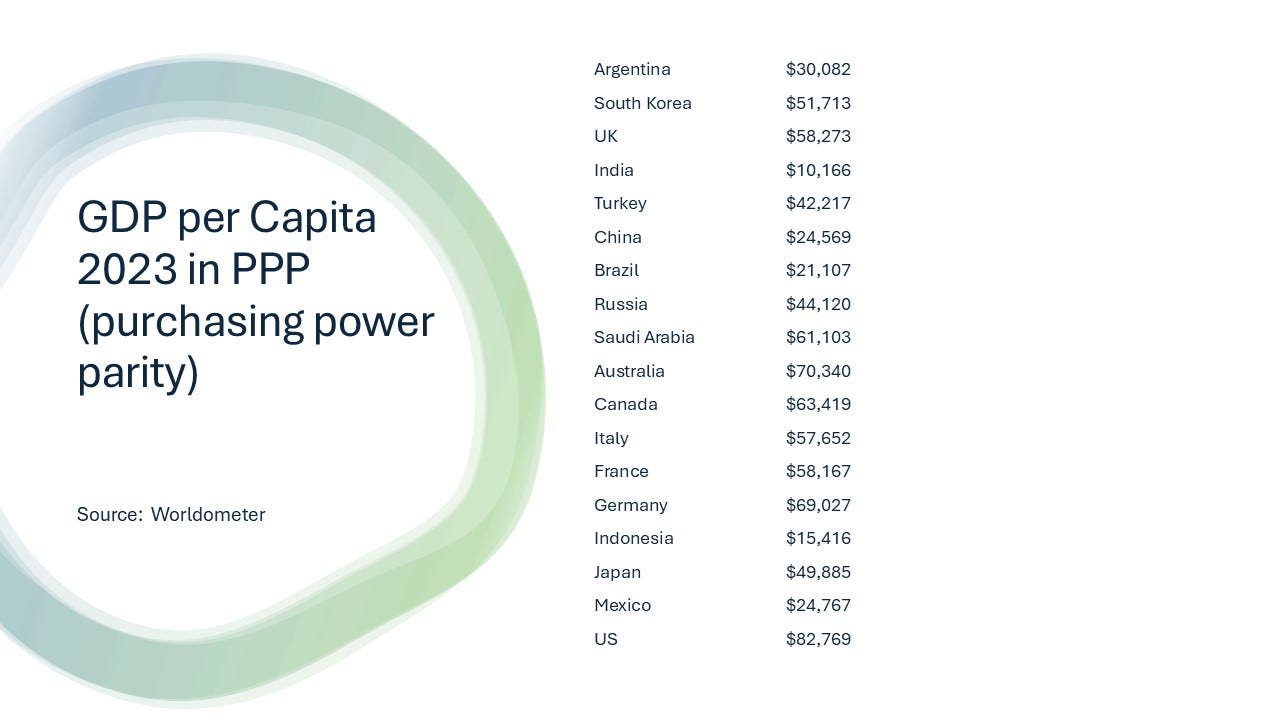Kevin Hassett, the Chair of the National Economic Council, shared the chart below on CNBC. He used it to explain why we need to impose "reciprocal tariffs" with other nations. Doesn’t the chart instead prove that protectionism doesn’t work? The chart ranks countries by their level of tariffs and other trade barriers. We are the lowest, but we have the highest GDP per capita of every country above us! Rather than copying them, we should be out preaching that they should be copying us!
Argentina tops the list. It has mismanaged its economy for years. Recently, voters in Argentina chose a libertarian to dismantle government controls, including heavy trade protections. Germany’s economy is solid, but we wouldn’t trade places with them. (2023 GDP per capita, U.S. $82,769, Germany $69,027; see chart below.) Which economy are we to envy? We are the best economy, and we have the lowest trade protections. No one should want tariffs.
President Trump is trying to reverse globalization. Good luck with that. Do you believe we can go back to a world with many self-sufficient countries? The world has become much smaller in the last 80 years. This change is thanks to our great advances in transportation and communication. You can’t wave a wand and say the world is no longer inter-connected. We love our products from all around the world.
A key tenet of free trade is this: when two countries trade and support each other, they build wealth. This makes war less likely. Free trade has been a key part of world harmony in this last 80-year period of “Pax Americana." With our world now going back to an “all against all” mindset, we risk wars beyond trade wars.
In our recent elections, Trump signs often stated, “No More Socialism.” Socialism has various meanings, but it usually means “government control of the economy.” Trade protections are a different form of government control. Trump’s April 2 proposals will lead to the U.S. having its most government-controlled economy ever. It is hard to fathom how much these tariffs will gunk up economies and confuse world businesses. These tariffs will suppress world trade and world wealth creation.
In 1980, the U.S. shifted to free-market capitalism as inspired by Ronald Reagan and Milton Friedman. This free-market approach enabled the age of globalization. We must remember that capitalism always seeks to go anywhere to achieve the highest sales prices and the lowest input costs. Capitalism and globalization love each other.
We economic observers of the 1980s feared what was coming. A tough time was about to be upon the working class. U.S. workers faced competition from countries where pay was just a fraction, earning 1/10th or less. Business leaders should have foreseen the populist backlash that would come. Rather, they maximized profits in the short term. In hindsight, keeping more production in the U.S. would have helped. It would have cut profit margins a bit, but it could have reduced backlash against globalization and growing wealth inequality. Business shortsightedly went for maximum profits then. Now they must endure a government-controlled economy that is not socialism but protectionism.
Was globalization a mistake? Trump thinks so. Yet here we are in 2025 with by far the highest GDP per capita of all the world’s large economies. I find Warren Buffett’s view interesting. He has often said, “On the production side, I’m a Republican; on the distribution side, I’m a Democrat.” Is there a greater capitalist out there than Warren Buffett? He refers to the U.S. economy as “the goose that keeps laying golden eggs” as a metaphor. Let’s not mess with the engine that drives the best GDP in the world.
On the distribution side, is there a more humane way for our society to spread wealth? Warren Buffett and his friend Bill Gates have inspired the super-rich to share their wealth through "The Giving Pledge." I love this super-humane way for the rich to share their blessings.
We have progressive income tax rates, but they were more progressive in the decades before the 1980s. Should we return to more progressive taxes since we have greater inequality today? Should there be universal basic income? Even the very conservative Milton Friedman saw promise in this idea. He referred to it as a negative income tax.
We must provide more vocational training and construction skills for future workers. Many of these jobs are now going to U.S. immigrants as native-born Americans have not found these attractive enough to pursue. Today, there are huge opportunities and great incomes in these jobs. You can’t hire a poor person in Vietnam to be your plumber.
We need to lower income and wealth inequality. Tariffs will lower inequality by making everyone poorer. Globalization has been inevitable, will remain inevitable, and we need to manage its effects. Free trade is the humane way to run the world economy and promote harmony among nations.
/






I wrote the above, but these are better!
https://www.thefp.com/p/tyler-cowen-liberation-day-was-even
https://www.msn.com/en-us/video/news/whartons-jeremy-siegel-on-trump-tariffs-this-is-the-biggest-policy-mistake-in-95-years/vi-AA1ChQSJ